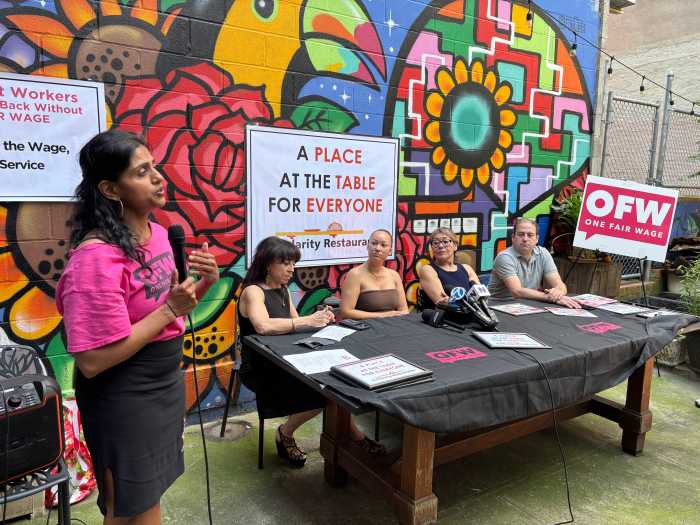Whether you are single or raising a family, you better have a pretty big paycheck if you want to live on Easy Street in New York City, new research shows.
A study released last month from SmartAsset, a consumer-focused financial company, shows that on average, a family of four needs to make at least $318,406 in order to live comfortably in the Big Apple.
That’s more than three times the city’s median household income of $76,607, according to the U.S. Census Bureau.
But single New Yorkers arguably have it worse. In fact, NYC ranked #1 for the city with the highest salary needed for a single adult to live comfortably in the United States. (Houston was ranked the best in the study.)
The study shows a single New Yorker without kids needs to make at least $138,570 annually or $66.62 in hourly wages, to sustain a comfortable lifestyle. Just to cover necessities alone, a single New Yorker needs an estimated $70,000, the research shows.
While New York has the highest salary needed to live as an individual, adding children is not as proportionally as expensive as it is in some other cities, Jaclyn DeJohn, managing editor of economic analysis at Smart Asset explained.
“When it comes to two working adults raising two children, New York City is only the fifth most expensive,” DeJohn said. “While this study didn’t specifically evaluate causes and effects, this discrepancy may be due to New York having a particularly expensive housing market relative to other cities. Adding additional residents to housing units decreases the cost per person, so if a family’s budget is concentrated mostly on housing, the benefit of adding family members will be outsized on a cost-per-person basis.
The SmartAsset findings come after another major study in February showed more than half of NYC is living at or near the poverty line. That study found that at 56%, most of the city’s population lives in poverty or with low incomes.
‘Living comfortably’ in NYC
What does it mean to “live comfortably?”
SmartAsset defines it using the 50/30/20 budget, which is when an individual or family uses 50% of income for essentials such as housing, groceries and transportation, 30% for discretionary spending and 20% for paying off debt, saving or investing.
Data from the study is based on the costs of housing, income taxes, food, transportation and other necessities.
Jaclyn DeJohn, managing editor of economic analysis at SmartAsset detailed how the research was collected.
“This cost data, assumed to be the minimal amount needed to simply survive, was used to represent 50% of the salary needed, and from this we extrapolated the total costs for individuals and families to also afford wants such as hobbies and entertainment as well as long-term savings,” she explained.
Feeling the squeeze
Many New Yorkers have become accustomed to economic turmoil in recent years. The city’s high cost of living coupled with low wages, nationwide inflation and even possible price gouging have put huge dents in the wallets and bank accounts of many New Yorkers.
Jake Elich, who lives with his wife on the Upper West Side, has a baby on the way. He said his family is feeling the financial strain.
“For me, it’s the potential challenges that will come with raising a child here that is of utmost concern,” he said. “Understandable why it costs so much, but stacking it on top of rent makes the situation very concerning.”
One New Yorker who requested to remain anonymous, is a teacher who lives with her musician fiancé in Manhattan. They moved several times in recent years because of sky-rocketing rent increases they could not afford.
“As a school teacher, we get about 3% raise every year,” she said. “The rent keeps rising, my salary hardly raises and my paychecks dwindle down so quickly. I have never felt so poor in my life.”
She said she works extra hours to have enough money for discretionary spending. She added that the bars and venues where her fiancé performs have not raised their fees for musicians in many years.
“I do have to work extra by teaching after school classes to have money for fun,” she said.
The 16-year-teaching veteran said she and her fiancé will have to face some difficult choices soon, including whether or not to stay in New York.
“I feel like I have to make six-figures to feel comfortable, even providing for a child if I am able to choose that,” she said. “Or, leave New York City, which is hard because we love it here. My fiancé’s work is heavily based here. A lot of years of networking and time went into his career.”
Betsy Shevey, who lives in Manhattan, is a senior on a fixed income. She struggles with paying for necessities so much that it has become a challenge to fit in money for fun or recreation activities.
“The cost of finding a place to swim is insane, even at schools, no less health clubs,” she said. “Treats like a restaurant meal are just a memory as the costs are absurd. Dentists are a whole other nightmare.”
Another New Yorker, Vittorio Bugatti, said he feels for his neighbors who are on fixed incomes or struggling to afford food and other necessities.
“I’ve been fortunate enough to be able to absorb a number of those costs, but a lot of people can’t,” he said. “Even so, I’ve felt a bit of sticker shock the last few years. ConEd has double or tripled in some cases. Food is still high.”
Bugatti suggested the high cost of living could be why a number of New Yorkers are leaving the city.“Quality of life is not matching the high costs, not to mention taxes are some of the highest in the country,” he said. “For people that are young like myself, it is definitely going to be more and more difficult for millennials and the upcoming generations to be able to afford the basic costs of living here in NYC.”





































